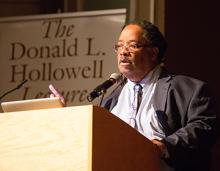Raising Awareness of the Role of Diversity in Social Services
Llewellyn Cornelius also guides the next generation of researchers
By Bonnie Miller Rubin
VOLUME 23 | ISSUE 2 | SUMMER 2016

Llewellyn Cornelius, AM '83 (Social Sciences), AM '85, PhD ’88 (SSA), who has spent his career expanding people’s awareness of the important role diversity plays in understanding society, has also played an critical role in developing a new generation of scholars to carry on that work.
He specializes in racial and ethnic health disparities research and is one of the most-cited African American scholars in social work. He took that work to a new venue in 2015 when he relocated from the University of Maryland, Baltimore (UMB) to the University of Georgia to become the Donald L. Hollowell Distinguished Professor of Social Justice and Civil Rights Studies.
“Equity is a cause I’ve been passionate about my whole life,” he says. “This position is the perfect extension of that.”
Cornelius is also passionate about his unofficial role: as a go-to resource and tireless advocate for a generation of minority social workers, said colleagues and former students. Many called him “invaluable” in defusing the responses to the highly-charged Freddie Gray case in Baltimore, a situation Cornelius still characterizes as “explosive.”
The U.S. Census reports that by 2020, more than half of American youth will be members of racial and ethnic minorities, yet the profession is not representative of the clients social workers often serve — a problem widely recognized but difficult to fix. The National Association of Social Workers reports that of the almost 102,000 active members, 86 percent are white and many work with minority communities.
Cornelius, who began his career at UMB, has trained more than 150 professionals in designing and conducting outcomes research, mentored 33 doctoral students and trained 10 fellows, some of whom were physicians, some PhD graduates in the social sciences, and one, an attorney.
Donna Harrington, professor and Associate Dean for Doctoral and Post-Doctoral Education at the School of Social Work at UMB, praised his work there. “Lee Cornelius is an incredibly dedicated scholar and professor, with a strong commitment to social justice, which is reflected in both his research and mentoring of students. As a colleague, he is a joy to work with; he pushes himself to excel and in doing so, he brings out the best in those he works with.”
At an age when it would have been easy to rest on his laurels at UMB, why did “Dr. C” — as his students call him — decide to take his career to a new intellectual home?
“I promised myself 10 years earlier that if I came across an opportunity to expand my horizon, I’d remain open to it,” he explained. “I found this position fascinating, an opportunity to expand my commitment to promoting a fair and inclusive society. It was asking me to step up and do more for others than I have ever done before.”
He will serve as director of the Center for Social Justice, Human and Civil Rights and the editor for the Journal of Poverty, which is published by the center.
Growing up in a Harlem tenement, such an illustrious resumé would have been unimaginable. His father worked for the New York Transit Authority and “we ate when he got paid,” he said. “I’d watch the buses go to Columbia University and it was like they were going off to a whole different world.”
Still, some early signs hinted of his future career path. He loved talking with neighbors from the front stoop, was an avid reader and wore glasses from age six, earning him the nickname “Professor.”
Cornelius headed to Syracuse University, where he earned his BA in psychology. He arrived at SSA just before Harold Washington launched his historic campaign to become Chicago’s first black mayor, further igniting the graduate student’s interest in the intersection of social work and social action.
His first field placement was at Children’s Memorial Hospital (now the Ann & Robert H. Lurie Children’s Hospital of Chicago), providing services to patients on renal dialysis, both at the medical center and during home visits on the South Side.
“It was where I first became involved in health care and received a warm welcome to the profession of social work. It was exciting to be in a place where we had a lot of in-service opportunities, along with cases that encouraged us to use our assessment skills.”
Cornelius earned two master’s degrees at the University of Chicago. One was from the Master in Arts Program in the Social Sciences with an emphasis in organizational behavior and the second from SSA, with health policy as his elective sequence.
His PhD dissertation was titled “The Impact of Medical Delivery on the Outcome of Care for Minorities and the Poor.”
SSA moved him even closer to his true calling. Faculty such as Dodie Norton, Donna Franklin (“she used empowerment practice models before empowerment was in vogue”) and Frank Breul all honed his professional development and had an impact on his work, he said.
Additionally, he cites the Council on Social Work Education Minority Fellowship Program — which was founded in 1974 and now has more than 600 alumni, 72 percent of whom have completed their doctorate — as playing a key role in his upward trajectory and the importance of making good connections.
“The mentorship I received in the MFP program informed my own mentorship of others. I think it’s one of the best examples of successful initiatives we can tap into to bring more diversity to our profession.”
Former students are grateful for his help. When Nikki Wooten for instance, was a doctoral student at UMB, she wasn’t sure she would find a mentor who would take a special interest in her career. As an African-American woman who entered higher education while still in the military, she didn’t exactly fit the traditional mold.
“What I got in Dr. Cornelius was someone who was really invested in my success as an academic and as a scholar,” says Wooten, an assistant professor of social work at the University of South Carolina. “For people of color to find someone like him is truly a rarity.”
Wooten, also an MFP fellow, said having an ally has been invaluable in navigating the politics of academia. “Early in my career, he encouraged me to be the sole author of papers, so people would get to know my voice,” Wooten explained. “Even after graduation, you can call him about anything, and he’s immediately responsive.”
Susan Klumper, AM ’11, a doctoral student at UMB, recalled how he could toggle effortlessly between teaching and his own scholarship, which includes community-based participatory research, psychosocial research, and work on survey and evaluation research.
During her practicum class, he guided students through critical self-inquiry for a research project, helping them come to a deeper understanding of the issues. The highly-charged police shooting cases of Trayvon Martin in Florida and Eric Garner in New York influenced the students’ decision to examine social workers’ involvement in political action, she said.
“At school, several of my colleagues and I spent time with students, just allowing them to share whatever they were feeling. We modified our class activities because it was more important to just talk and reflect on events, separate from the project. If I demonstrated any leadership at all, it would be more that I gave them time to grieve along with the community,” Cornelius says.
In addition to teaching survey research, he has been involved in the design and implementation of a wide variety of studies, such as a statewide survey which examined the cultural competency of mental health providers; the evaluation of global community-based HIV prevention and treatment efforts; and the development and implementation of surveys that looked at the use of technology in social work.
Cornelius’ prevention research looks at developing community responses that are culturally appropriate as well as educational, attitudinal, and behavioral change interventions. He has also examined the barriers to the successful adoption of interventions by individuals, practitioners, and communities.
Cornelius has been recognized as the fifth most-cited African-American scholar in social work in a study published in the journal Research on Social Work Practice. In May of 2014, Oxford University Press published A Social Justice Approach for Survey Design and Analysis, which he co-authored with Donna Harrington. His book, Designing and Conducting Health Surveys: A Comprehensive Guide has been cited almost 1,200 times since it was published in 2006.

At the University of Georgia, he is engaging a new crop of multicultural scholars. As an example, he cited a recent project leading a group of local youth in creating a mural that celebrated civil rights leaders.
“I noticed the glow on people’s faces in seeing this unfold. Seeing them create something that affirmatively speaks to their own self-defined journey. Not of slavery and sharecropping, but of striving to achieve social justice. I know I’m exactly where I need to be.”